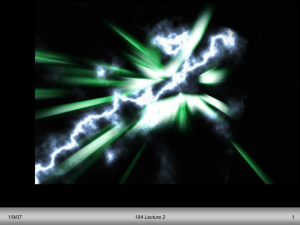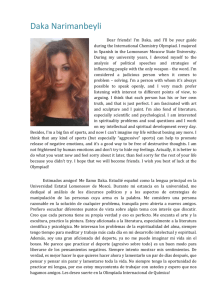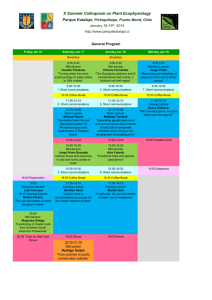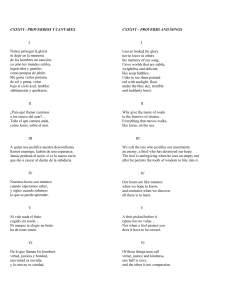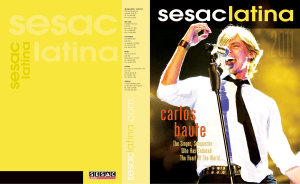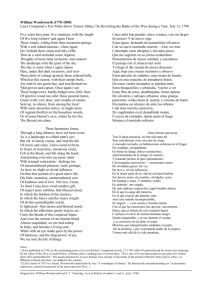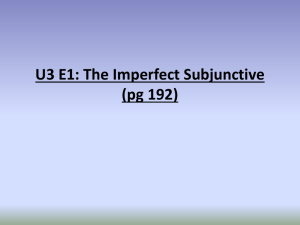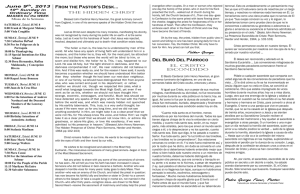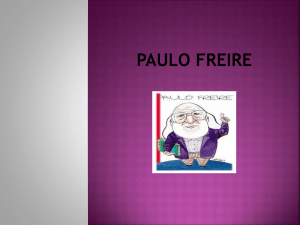The University of Texas at El Paso
advertisement
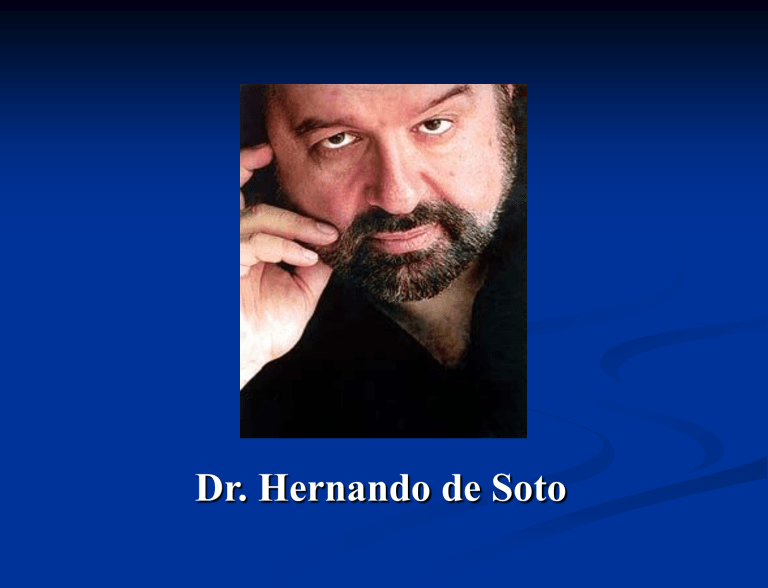
Dr. Hernando de Soto Hernando de Soto Final Report 05/12/2004 UTEP President’s Office Center for Inter-American and Border Studies Business Leadership Council Center for Law and Border Studies College of Business Administration Plan Estratégico de Juárez, A.C. El Colegio de la Frontera Norte Fundación del Empresariado Chihuahuense, A.C. Instituto Mexicano de Ejecutivos de Finanzas, A.C. Universidad Autónoma de Ciudad Juárez Participating Institutions/Organizations Center for Inter-American Border and Studies ciudad juárez El Paso, Texas Press Releases Release Biography Hernando de Soto Hernando de Soto is president of the Institute for Liberty and Democracy (ILD), headquartered in Lima, Peru. and was recently chosen as one of the five leading Latin American innovators of the century by Time magazine in its special May 1999 issue on "Leaders for the New Millennium." De Soto was born in Arequipa, Peru, in 1941 and did his post-graduate work at the Institut Universitaire de Hautes Etudes Internationales in Geneva. He has served as an economist for the General Agreement on Tariffs and Trade, as a principal of the Swiss Bank Corporation Consultant Group, and as a governor of Peru's Central Reserve Bank. De Soto was President Alberto Fujimori's personal representative and principal advisor until he resigned at the time of the President's coup d'état. During that period, he and the ILD were responsible for some 400 laws and regulations that have modernized Peru's economic system, opening it up to greater participation by the majority. In 1992, De Soto was the keynote speaker at a TransAtlantic Futures forum, speaking on the topic, "Are Democracies and Markets Failing in Latin America?“ His first book, “The Other Path: The Economic Answer to Terrorism,” investigated the Peruvian economy and argued that a viable market system—capable of generating wealth—was operating under the nose of Peruvian government. As a result, De Soto was attacked by the Shining Path Guerrilla Movement. His latest book, “The Mystery of Capital: Why Capitalism Triumphs in the West and Fails Everywhere Else,” was based on research by the Institute for Liberty and Democracy and concludes that most of the world's population holds the answer to its poverty in its own hands—its property. Source: www.theglobalist.com/DBweb/AuthorBiography.aspx?AuthorId=32 Press Release (English) Contact: Jon Amastae, Ph. D. Director, UTEP Center for Inter-American Border Studies 915/747-5196 Acclaimed Peruvian Economist to Speak at UTEP Internationally renowned economist and author Hernando de Soto will present a lecture Wednesday, Oct. 15, at the University of Texas at El Paso. He will speak at Magoffin Auditorium at 7:00 p.m. A presentation in Juárez, Mexico, will also be held earlier that day. De Soto is the director of Peru's Institute for Liberty and Democracy and an expert in market economics and property rights. The institute is a private, non-profit think tank that studies market development in third-world countries. His first book, The Other Path: The Economic Answer to Terrorism, investigated the Peruvian economy and argued that a viable market system—capable of generating wealth—was operating under the nose of Peruvian government. As a result, he was attacked by the Shining Path guerilla movement. His latest book, The Mystery of Capital: Why Capitalism Triumphs in the West and Fails Everywhere Else, was based on research by the Institute for Liberty and Democracy and concludes that most of the world's population holds the answer to its poverty in its own hands—its property. The key to unlocking the potential for growth is to create ways for the poor to recognize and use their own capital. De Soto’s binational visit is sponsored by a consortium of U.S and Mexican groups, including UTEP, the Business Leadership Council, the Plan Estratégico de Juárez, El Colegio de la Frontera Norte (COLEF), the Universidad Autónoma de Juárez, the Fundación del Empresariado Chihuahuense and the Instituto Mexicano de Ejecutivos de Finanzas (IMEF). UTEP takes pride in sponsoring speakers on a broad range of ideas and global topics of importance to the Border region and the Americas, including demographics, climate change, information technology, health, and geopolitical and socioeconomic trends. Press Release (Spanish) Contactarse con: Dr. Jon Amastae Director, Centro de Estudios Inter-Americanos y Fronterizos de UTEP 915/747-5196 Pronunciará Discurso en UTEP Distinguido Economista Peruano El internacionalmente reconocido economista y autor Hernando de Soto dará una conferencia el miércoles 15 de octubre en la Universidad de Texas en El Paso. El mismo día hará una presentación en Ciudad Juárez. De Soto es Director del Instituto Libertad y Democracia y un experto en economía informal y derechos de propiedad. Este instituto peruano, privado y sin fines de lucro es un centro de investigación, consultoría y desarrollo de políticas o (think tank) que examina el desarrollo de los mercados en países del tercer mundo. Su primer libro, El otro sendero: la respuesta económica al terrorismo, analiza la economía peruana y sostiene que la economía informal del Perú es en realidad un sistema de mercado viable, capaz de generar riqueza y contribuir a la solución de los problemas sociales que generan la inestabilidad política en ese país. Su último libro, El misterio del capital: por qué el capitalismo triunfa en occidente y fracasa en el resto del mundo, está basado en investigaciones realizadas por el Instituto Libertad y Democracia y llega a la conclusión de que la mayor parte de la población mundial tiene en sus propias manos la solución al problema de la pobreza: es decir, la propiedad. La visita binacional de De Soto es patrocinada por un consorcio de grupos mexicanos y estadounidenses, entre los cuales figuran La Universidad de Texas en El Paso, el Business Leadership Council, el Plan Estratégico de Juárez, El Colegio de la Frontera Norte (COLEF), la Universidad Autónoma de Ciudad Juárez, la Fundación del Empresariado Chihuahuense, y el Instituto Mexicano de Ejecutivos de Finanzas (IMEF). General Release Contact: Jon Amastae, Ph.D. Erica Martinez Director, UTEP Center for Inter-American and Border Studies Writer, University Communications 915/747-5196 or 915/747-5085 Acclaimed Peruvian Scholar to Speak at UTEP -Millennium Lectures Continue with Hernando de SotoInternationally renowned economist and controversial author Hernando de Soto will present a lecture at 7 p.m. Wednesday, Oct. 15, at the University of Texas at El Paso, Undergraduate Learning Center, Room 106. A Spanish video link will be available in Room 116. A presentation in Juárez, Mexico, by De Soto will also be held that day. His lecture, “Economic Development: From Poverty to Capital,” is part of UTEP’s Millennium Lectures Series. “Hernando de Soto's ideas on economic development function in the space between economics and the legal system,” said Jon Amastae, director of UTEP’s Center for Inter-American and Border Studies. “They show that economic development can occur in a context of poverty, provided that the legal system provides the mechanisms for the poor to leverage their assets and create capital.” De Soto, a 2001 Nobel Prize in economics nominee, is the director of Peru's Institute for Liberty and Democracy and an expert in informal economics and property rights. The institute is a private, non-profit think tank that studies market development in third-world countries. His first book, “The Other Path: The Economic Answer to Terrorism,” investigated the Peruvian economy and argued that a viable market system—capable of generating wealth—was operating under the nose of Peruvian government. As a result, De Soto was attacked by the Shining Path Guerrilla Movement. His latest book, “The Mystery of Capital: Why Capitalism Triumphs in the West and Fails Everywhere Else,” was based on research by the Institute for Liberty and Democracy and concludes that most of the world's population holds the answer to its poverty in its own hands—its property. De Soto’s binational visit is sponsored by a consortium of U.S and Mexican groups, including UTEP, Plan Estratégico de Juárez, Colegio de la Frontera Norte (COLEF), Universidad Autónoma de Juárez, Fundación del Empresariado Chihuahuense and Instituto Mexicano de Ejecutivos de Finanzas (IMEF). UTEP’s Millennium Lectures Series focuses on issues and ideas shaping the new millennium and features speakers on a broad range of global topics, including demographics, climate change, information technology, health, and geopolitical and socioeconomic trends. -30- Release-Media Availability Contact: Jon Amastae, Ph.D. Center for Inter-American and Border Studies Erica Martinez Writer, University Communications Oct. 14, 2003 Director, UTEP 915/747-5196 or 915/747-5085 MEDIA ADVISORY Internationally renowned economist and controversial author Hernando de Soto will make a presentation and lecture in Juárez and El Paso, respectively, on Oct. 15-16. The following is the media availability schedule. Wednesday, Oct. 15 Press conference. 10:15-11 a.m. Centro de Convenciones Cibeles, Blvd. Tomás Fernandez No. 8450, Campestre Senecú, Juárez, Mexico. Lecture. 7 p.m. at the University of Texas at El Paso, Undergraduate Learning Center, Room 106. A Spanish video link will be available in Room 116. The lecture is followed by a question and answer session. Thursday, Oct. 16 Press session. 9:45-10:15 a.m. UTEP Union Building East, Third Floor, Smiley Room, Room 310. De Soto, a 2001 Nobel Prize in economics nominee, is the director of Peru's Institute for Liberty and Democracy and an expert in informal economics and property rights. The institute is a private, non-profit think tank that studies market development in third-world countries. -30- Release-Organizations U.S., Mexican Groups bring Peruvian Economist to El Paso Hernando de Soto’s binational visit and Millennium Lecture is sponsored by a consortium of U.S and Mexican groups, including UTEP, Plan Estratégico de Juárez, El Colegio de la Frontera Norte (COLEF), Universidad Autónoma de Ciudad Juárez, Fundación del Empresariado Chihuahuense and Instituto Mexicano de Ejecutivos de Finanzas (IMEF). The University of Texas at El Paso, the only doctoral-research university in the United States with a MexicanAmerican majority student population, has received national recognition for providing access to first-generation students and excellence in academic and research programs. www.utep.edu Business Leadership Council is dedicated to improving the El Paso community by providing quality research on vital issues, including education, government and the economy. Plan Estratégico de Juárez promotes the organization of public and private entities within Juárez to develop a plan of action for the improvement of city and citizens’ quality of life. www.planjuarez.org El Colegio de la Frontera Norte (COLEF) is a research and higher education institution, focusing its studies on the U.S-Mexico border region and issues within the area. www.colef.mx The Universidad Autónoma de Ciudad Juárez is recognized for its academic program in Northern Mexico to students both nationally and internationally. The university offers bachelor’s and master’s programs in engineering, social sciences and administration, biosciences and architecture. www.uacj.mx Fundación del Empresariado Chihuahuense focuses its philanthropic efforts in the areas of health and education. Since 1996, the organization has supported projects totaling more than $25 million throughout the state of Chihuahua, Mexico. www.fundacion.org.mx The Mexican Institute of Finance Executives is dedicated to the success of its associates through the sharing of financial ideas and research. Members of the institute include financial officers for companies and institutions in both the private and public sectors in Mexico. www.imef.org.mx -30- UTEP Flyer & Poster Invitation to the Millennium Lecture UTEP Invitation Letter to the Millennium Lecture TH E U N I V E R S I TY O F TE XAS AT E L PAS O Center for Inter-American and Border Studies Dear : Dr. Hernando de Soto is one of the most important economists working today. A former Finance Minister of Perú, he is the founder and director of the Institute for Leadership and Democracy in Lima, Perú, where he has conducted research on the problems of economic development in the “third world.” His most recent book, The Mystery of Capital, has articulated the central question for political economy in our time: Why has capitalism succeeded in the West and failed everywhere else? His answers are based on investigation of the development of shanty-towns in Latin American cities, the growth of the informal economic sector in such cities, the relationship between the legal and economic systems, and an original interpretation of US history in the 19th century. His ideas have been promoted by a wide range of political figures, from ex-President Bill Clinton to the editors of The Economist and the US Department of Commerce in the current administration. He has been nominated for the Nobel Prize. Some materials on de Soto are attached; more information can be found at the ILD website, www.ild.org.pe The border community presents an illustration of many of his ideas and a challenge for others. Now, through a binational effort led by the University of Texas at El Paso and the Plan Estratégico de Juárez, the El Paso-Cd. Juárez community has a unique opportunity to hear Dr. de Soto speak and learn about his ideas. I am pleased to invite you to hear Hernando de Soto on Wednesday, October 15 at 7:00 pm in UTEP’s Magoffin Auditorium. His presentation will outline his approach to the recognition of hidden capital and ways in which its growth can be stimulated, topics of obvious relevance to our region. We hope you will be able to attend what is sure to be an excellent program. If you would like to read more about Mr. de Soto’s ideas in advance, his books are available at the UTEP bookstore, Barnes and Noble, and through the internet. Sincerely, Jon Amastae, Ph.D. Director 500 W. University Ave. El Paso, Texas 79968-0605 (915) 747-5196 FAX: (915) 747-5574 www.utep.edu/cibs UTEP Invitation Letter to the Breakfast T H E U N I V E R S I TY O F T E XAS AT E L PAS O Dear Center for Inter-American and Border Studies : Dr. Hernando de Soto is one of the most important economists working today. A former Finance Minister of Perú, he is the founder and director of the Institute for Leadership and Democracy in Lima, Perú, where he has conducted research on the problems of economic development in the “third world.” His most recent book, The Mystery of Capital, has articulated the central question for political economy in our time: Why has capitalism succeeded in the West and failed everywhere else? His answers are based on vast investigation of the development of shanty-towns in Latin American, African, and Asian cities, the growth of the informal economic sector, the relationship between the legal and economic systems, and an original interpretation of US history in the 19th century. His ideas have been promoted by a wide range of political figures, from ex-President Bill Clinton to the editors of The Economist and the US Department of Commerce in the current administration. He has been nominated for the Nobel Prize. Some materials on de Soto are attached; more information can be found at the ILD website, www.ild.org.pe The border community presents an illustration of many of his ideas and a challenge for others. Now, through a binational effort led by the University of Texas at El Paso and the Plan Estratégico de Juárez and other collaborators, the El Paso-Cd. Juárez community has a unique opportunity to hear Dr. de Soto speak and learn about his ideas. I am pleased to invite you to hear Hernando de Soto on Wednesday, October 15 at 7:00 pm in UTEP’s Magoffin Auditorium. At that time he will outline his approach to the recognition of hidden capital and ways in which its growth can be stimulated, topics of obvious relevance to our region. We hope you will be able to attend what is sure to be an excellent talk. In addition, a smaller number of people are invited to a less formal breakfast workshop on Thursday, Oct. 16 at 8:00 am in the Tomás Rivera Conference Center in the UTEP Union. At this session participants will have the opportunity to participate in a more detailed examination of de Soto’s ideas and to probe their relevance to El Paso and the border region. I am pleased to invite you also to the morning session. No response is necessary for the evening session on Oct. 15. However, if you plan to attend the morning session on Oct. 16, please return the enclosed card, as participation is limited. A pass is enclosed for reserved parking at both events. We look forward to seeing you at this unique opportunity. If you would like to read more about Mr. de Soto’s ideas in advance of the talk, his books are available at the UTEP bookstore, Barnes and Noble, and through the internet. More information on both events is available at our website, www.utep.edu/cibs. Sincerely, Jon Amastae, Ph.D. Director 500 W. University Ave. El Paso, Texas 79968-0605 (915) 747-5196 FAX: (915) 747-5574 www.utep.edu/cibs Article in the Prospector Ad in El Paso Inc. Budget Contributors for Hernando de Soto’s Events UTEP Summary of Expenses & In-kind Contributions Summaries of Events Breakfast Meeting Hernando de Soto Breakfast Meeting Oct. 26, 2004 Tomás Rivera Conf. Center Peruvian economist Hernando de Soto spoke at UTEP’s Tomás Rivera Conference Center on Oct.6, 2003, to a group composed of members of the El Paso Business Leadership Council and UTEP College of Business Administration faculty. Because most of the attendees had not heard his Millennium talk the previous evening, he summarized it briefly ( refer to Millenium Lecture). The breakfast session included greater focus on the process of creating formalized value, and the ways in which American often mis-understands its own history in this regard. Noting that such programs as the Homestead Act were in fact mechanisms through which the law caught up with what people were already doing (taking informal possession of the land), he argued that the common Latin American phenomenon of land invasion followed by informal construction of housing is actually very similar. What Latin American Governments need to do is to make it possible for the landless to own land formally rather than engaging in absolute resistance. Reminding the audience that in the US (as the paradigmatic example of an economically developed country), the great majority of new jobs are created through small businesses, AND small businesses are typically created through equity loans on homes, de Soto argued that the ultimate key to economic development in much of the world is not through the importation of jobs in the current globalizing manufacturing sector, but in a more bottom-up pattern of internal generation of businesses and economic growth. Through the discussion, de Soto was surprised to learn that even in the US, phenomena more stereotypical of Latin America can be found, such as the colonias along the US-Mexico border, which exist for many of the same reasons and create many of the same combinations of advantages and limits for their inhabitants as in Latin America. Millennium Lecture Hernando de Soto Oct. 25, 2004 - UGLC 106/116 Peruvian economist Hernando de Soto spoke at UTEP’s Undergraduate Learning Center on Oct. 25, 2003, delivering the first Millennium lecture of 2003-2004. In perfect English, the Swiss-educated de Soto easily convinced approximately 800 listeners that economics is not necessarily “the dismal science.” Moreover, he offered a number of insights of great relevance to economic development in El Paso-Júarez and similar communities wrestling with problems of economic development. Following closely on his best-selling The Mystery of Capital /El Misterio del Capital de Soto began by emphasizing the importance of formal recognition of value. That is, that in modern societies value must be registered in formal ways for it to reach its full potential in exchange, which then leads to growth. Using such immediate illustrations as an apple, and then his own passport, the dynamic de Soto showed his audience that without such formal registration of ownership, assets of value cannot be traded. This fundamental insight was then extended to such things as home ownership. Repeating his oft-quoted line that even dogs recognize property ownership and boundaries, de Soto talked about the economic limits inherent in lack of formal property registration in much of the world. That is, while the poor in Latin American and elsewhere display extreme economic ingenuity and energy in adding value to their once-marginal housing, they cannot realize the full potential of their investment because they often lack formal title, and thus cannot either sell or use the property for collateral. And therefore, unlike the pattern in much of the US, they cannot begin formal businesses, but are limited to the informal sector for business development. While much of de Soto’s work has documented and extolled the importance of the informal sector in developing countries, he took great care to explain how circumstances that force people into informality limit a country’s potential for growth. First, it removes a large percentage of economic activity from socio-governmental control, including the capacity to tax and generate funds for public purposes. Second, it creates a disregard for civic structure and purpose. And, in the end, of course, it is economically self-limiting. Finally, de Soto touched on the relationship between a country’s economic and legal systems. It is the legal system that must provide a transparent, simple, and accessible system for people to create economic value. This includes basic landholding for housing, of course, but it also includes the system for creating a business. One of de Soto’s ground-breaking investigations was the attempt to create a series of businesses in several sectors in Perú. In some cases, hundreds of steps were required, taking several years. He has said clearly that economic growth depends absolutely on good public policy and administration. De Soto is the President of the Institute for Liberty and Democracy, in Lima, Perú, and has been widely hailed as the political economist whose ideas often appeal to both the right and the left of the political spectrum, and the first to provide wholistic suggestions to problems of economic development in much of the world. He has been nominated for the Nobel Prize in economics and has worked as a consultant for many countries, including Mexico and Thailand, just to name two. Photo Gallery Millennium Lecture Millennium Lecture Millennium Lecture Millennium Lecture Millennium Lecture Millennium Lecture Millennium Lecture Millennium Lecture Millennium Lecture Millennium Lecture Millennium Lecture Millennium Lecture Millennium Lecture Millennium Lecture Millennium Lecture Millennium Lecture Millennium Lecture Millennium Lecture Millennium Lecture Millennium Lecture Millennium Lecture Millennium Lecture Millennium Lecture Millennium Lecture Millennium Lecture Millennium Lecture Millennium Lecture Millennium Lecture Millennium Lecture Millennium Lecture Millennium Lecture Millennium Lecture Millennium Lecture Millennium Lecture Millennium Lecture Millennium Lecture Millennium Lecture Breakfast Meeting Breakfast Meeting Breakfast Meeting Breakfast Meeting Breakfast Meeting Breakfast Meeting Breakfast Meeting Breakfast Meeting Breakfast Meeting Breakfast Meeting Breakfast Meeting Breakfast Meeting Breakfast Meeting Breakfast Meeting Breakfast Meeting Breakfast Meeting Breakfast Meeting Breakfast Meeting Ciudad Juárez Juárez Publicity Materials Plan Estratégico Flyer & Poster Electronic Invitation to Juárez Conference Electronic Invitation to the Media Formal Invitation to the Juárez Conference Ad in The Economist 58 THE ECONOMIST Feb 1st 2003 Face value |The economist versus the terrorist Hernando de Soto Believes that capitalism can defeat Terrorism TO BE the target of a terrorist campaign is not the usual fate of an economist. But Hernando de Soto is no ordinary practitioner of the dismal science. It was his procapitalist intellectual crusade against Shining Path terrorists in his native Peru that made him one of their top targets; he survived at least three attempts on his life. Those ideas, set out in his 1987 bestseller, “The Other Path”, may even have helped to turn the poor against the Shining Path, ensuring its defeat. What worked in Peru, he says, can work wherever terrorism now thrives. After the September 11th terrorist attacks, this message gained a new urgency. Mr de Soto was already increasingly influential with international policymakers, thanks to a second book, in 2000, entitled “The Mystery of Capital: Why Capitalism Triumphs in the West and Fails Everywhere Else”. Now, he is everywhere. So far, over 20 government leaders—from Afghanistan to Mexico to Russia—have sought his counsel. This week alone he was championed by Bill Clinton at the World Economic Forum in Davos; and then he discussed development with Bono, a rock star, and Gordon Brown, Britain's chancellor of the exchequer. Mr de Soto is charismatic and sells his ideas energetically. But he is no mere talker. Besides Peru and El Salvador, which made reforms some years ago based on his ideas, Mr de Soto and his think-tank, Institute for Liberty and Democracy, have recently been working with the governments of Mexico, Egypt, the Philippines, Honduras and Haiti— which is expected to be the first of these countries to introduce new legislation in April. Marx and Engels, Mr de Soto's pet dogs, were so named because “they are German, hairy and have no respect for property”. It is a carefully chosen joke, for respect for property is at the heart of Mr de Soto's economic creed—and may explain why his earliest foreign supporters, in the 1980s, were right-wingers such as Margaret Thatcher, Richard Nixon and Dan Quayle. Yet Mr de Soto is not one of those economists who thinks that the key to capitalism's success is to protect existing, legally established property rights, come what may. On the contrary, he argues that capitalism will thrive, and overcome threats such as terrorism, only if legal systems change so that most of the people feel that the law is on their side. Creating this sense of inclusion requires many things, including marketing the idea aggressively to the poor. But one of the best symbols of change is a mass programme of giving full legal protection to the de facto property rights that are observed informally by the (typically poor) people now living beyond the formal law. According to Mr de Soto's research, based on interaction with extra-legal communities in several countries, such informal property rights cover assets—notably, land and housing—worth many billions of dollars. Informal systems of property rights usually make such assets “dead capital”, meaning that it is hard to use them as collateral for a loan, which might be used to start a business, for example. Bringing these rights into the formal legal system will unleash this capital and spur growth, says Mr de Soto: an efficient, inclusive legal system preceded rapid development in every rich country. Critics of Mr de Soto contend that he is selling a simplistic universal solution to many different, often culturally specific, obstacles to capitalism or sources of terrorism. What, for instance, do the disaffected rich Arabs of al-Qaeda, motivated by heavenly virgins, have in common with the brutal Marxists of the Shining Path? Can there be a common cure? Mr de Soto concedes that it was lucky the Shining Path were so cruel to their potential supporters among the poor; Che Guevara would have been harder to beat, as “he was a nice guy”. Yet he believes that most poor people, given the chance to participate fairly in the capitalist system, would do so rather than stay outside. And although not all terrorists are from poor backgrounds, or motivated by materialistic goals, most tend to survive—as did the Shining Path—by hiding among the world's excluded. As for cultural specificity, understanding in minute detail the practical rules governing each extra-legal society is the essence of Mr de Soto's approach. Without this, it is impossible to design formal laws acceptable enough to make the excluded feel included. Indeed, the lengths to which Mr de Soto went in Peru to help make coca-growing farmers of the Amazon feel included enough to reject the Shining Path were extremely culturally specific. His then boss, the then-president, Alberto Fujimori, and the army agreed to recognise the farmers' informal militias, grant them land titles and decriminalise the growing of coca; Mr de Soto even got the elder George Bush to support this strategy, in exchange only for a signed pledge from farmers that they would begin a programme of crop conversion away from coca. This certainly undermined support for the Shining Path. But although, on a recent visit, The Economist found that the farmers still felt (and valued being) included—a big achievement—crop conversion had not gone well. Coca output is still high. Rising coca, and falling coffee and cocoa, prices have not helped. But Mr de Soto says the job was not finished properly. Mr Fujimori envied Mr de Soto's popularity and stopped him implementing all his plans. New land rights were granted that did not properly match old informal rights. Mr de Soto could not bring in multinationals to oversee crop conversion. Mr de Soto draws several lessons from this. Reform is no quick fix, but a long-term project demanding specific cultural knowledge. And it must be driven by a head of government (who presumably needs to get enough of the credit not to become jealous of Mr de Soto). His challenge now is to persuade other government leaders to turn expressions of interest into action. Wish him luck, for capitalism may not have a better path. Article in Diario de Juárez Newspaper 16 de Octubre del 2003 Article in El Norte Newspaper Budget Patrocinadores de los eventos de Hernando de Soto Summaries of Events Objetivos de la visita Visita de Hernando de Soto a Juárez/El Paso Octubre 15, 2003 Dos Actividades en Juárez: Conferencia Magna: Título: “México: rico en capital muerto” Público amplio de diversos sectores y ámbitos de Juárez y El Paso Taller Título: “El misterio del capital en Juárez” Participantes: representantes del sector público, académico, de la iniciativa privada y de la sociedad civil. Objetivos Conferencia Magna: Abordar el tema central del libro El misterio del capital. El tema deberá abarcar su dimensión o contexto mundial: la presencia del capital muerto como común denominador en los países en vías de desarrollo y en los que han salido del comunismo. Luego se deberá abordar el contexto nacional: lo que aplica al caso de México Finalmente y como principal objetivo, se puntualizaría en tocar el tema en su contexto de la frontera México-Estados Unidos (Juárez/El Paso), lugar en el que se fusionan las economías de dos países muy dispares, lugar en el que se dan contrastes y traslapes a la vez de una economía con la otra, lugar en el que tanto el subdesarrollo como el potencial de riqueza están igualmente presentes en ambos lados de la frontera. Objetivo Taller: Construir una visión panorámica y colectiva sobre Juárez de lo que se desprende del libro El misterio del capital a través de la siguiente metodología: se le planteará a Hernando de Soto una serie de preguntas en torno a cuatro temas—desarrollo urbano, desarrollo económico, administración pública y propuestas caso Juárez. Después de la intervención de Hernando de Soto en respuesta a las preguntas de cada tema, se tendrá una discusión abierta con los participantes del taller. Reseña sobre Juárez: Documento del pre-diagnóstico “¿Quién es Juárez?” del Plan Estratégico de Juárez (www.planjuarez.org/documentos.ssp) Quién es Juárez Junta de Planeación del Taller 8–10:30AM 12–2PM Visita Hernando de Soto a Juárez Octubre 15, 2003 Resumen de la reunión del lunes, 8 de septiembre según L. Vargas Conferencia Magna Títulos alternos: “México: rico en capital muerto” (se discutió lo impertinente de incluir la palabra muerto en un contexto juarense) “La Frontera Norte de México: rica en capital improductivo” “La abundancia del capital inactivo en México: Hacia una nueva esperanza en la creación de riqueza en la frontera Norte” (este último quizás quedo un poco largo pero en lo particular me gusta) OBJETIVOS: Abordar el tema central del libro El misterio del capital. El tema deberá abarcar su dimensión o contexto mundial: la presencia del capital muerto como común denominador en los países en vías de desarrollo y en los que han salido del comunismo Luego se deberá abordar el contexto nacional: lo que aplica al caso de México Finalmente y como principal objetivo, se puntualizaría en tocar el tema en su contexto de la frontera México-Estados Unidos (Juárez/El Paso), lugar en el que se fusionan las economías de dos países muy dispares, lugar en el que se dan contrastes y traslapes a la vez de una economía con la otra, lugar en el que tanto el subdesarrollo como el potencial de riqueza están igualmente presentes en ambos lados de la frontera. Taller: “Cómo desencadenar el misterio del capital en Juárez” (FAVOR evaluar este título si es apropiado para el taller) Participantes directos: 20 Sector Público (autoridades municipales y del gobierno del estado): 8 Académicos/Investigadores: 6* OSCs: 3 IP/Cámaras: 3 Público adicional: 30-35 personas */ 2 COLEF, 2 UACJ; posiblemente 1 ITESM y 1 ITCJ Junta de Planeación del Taller Objetivo del Tall.er: Plantear a Hernando de Soto una serie de preguntas en torno a cuatro temas (módulos): desarrollo urbano, desarrollo económico, administración pública, propuestas caso Juárez en cuanto al tema general del taller Estructura: Se asignará a los académicos/investigadores** el formular las preguntas a plantear en cada uno de los módulos basándose en la lectura y estudio del libro El misterio del capital. Se contará con un moderador (por parte de la UACJ) y un relator (por parte de COLEF). Se iniciará el taller por parte del moderador con las introducciones necesarias y la explicación del formato y reglas que se aplicarán al taller. Le seguiría las intervenciones de los cuatro académicos (2 de COLEF y 2 de UACJ) encargados de formular las preguntas relevantes a cada módulo. Después de cada intervención se solicitaría la respuesta de Hernando de Soto para luego abrir un espacio de discusión general de los participantes del taller. La última de estas intervenciones sería el tema de propuestas por lo que se prestaría que con ello se orientara la sesión al cierre pero también con la respuesta o reacción de Hernando de Soto a este tema. Tiempos: Inicio: 5-10 minutos Postulación de preguntas: 1.40 minutos Cierre: 5-10 minutos En esta última parte se darían los debidos agradecimientos y se avisaría que la relatoría se estaría circulando a los participantes del taller. También se invitaría al público al evento de la tarde en UTEP. **/ Académicos considerados para cada uno de los 4 temas/módulos: Desarrollo económico: Sergio Peña, COLEF Administración pública: Gustavo Ordóñez, COLEF Desarrollo urbano: Arq. Miguel Angel Argomedo, UACJ Propuestas: Manuel Loera, UACJ Participantes en el Taller de Juárez Taller con Hernando de Soto “El Misterio del Capital en Juárez” Presidencia Municipal, Salón Francisco I. Madero 15 de octubre de 2003 Participantes Directos en el Taller: 24 Sector Público (8 representantes) Lic. Jesús Alfredo Delgado Arq. Luis Felipe Siqueiros Lic. María Antonieta Venzor Ing. Arcadio Serrano Ing. Oscar Ibáñez Lic. Ricardo Martínez Ing. Francisco Gaytan Participantes en el Taller de Juárez Ing. Rafael Chávez Trillo (Obras Públicas) Académicos/Investigadores (9) Samuel Velarde (ITCJ) Alberto Araujo (ITESM) Sergio Peña (desarrollo económico, COLEF) Gerardo Ordóñez (administración pública, COLEF) Rodolfo Rubio (relator, COLEF) Roberto García Ortega (COLEF) Arq. Miguel Angel Argomedo (desarrollo urbano, UACJ) Mtro: Manuel Loera (propuestas para Juárez, UACJ) Servando Pineda (moderador, UACJ) Organizaciones de la Sociedad Civil OSC (3) Pablo Cuarón (FECHAC) Luz Ma. Villalba (Techo Comunitario) Hernán Ortiz (OPI) IP/Cámaras (4) Lic. Carlos Castañeda (CANACO) Ing. Oscar Legarreta (CANACINTRA) Arq. Roberto Mora (CMIC) María Asunción Gutiérrez (COPARMEX) UACJ Sadri Slim Javier Chávez Alfredo Granados Miguel Angel Calderón Francisco Llera COLEF Roberto Hurtado Luis Cervera Gustavo Cordoba Lourdes Romo Cesar Fuentes UTEP Jon Amastae Charles Crespy Sandra Aguirre-Covarrubias Ann Coursey (El Paso Inc.) Plan Estratégico Lucinda Vargas Edgar Lara Organizaciones de la Sociedad Civil Público adicional (En calidad de oyentes): 16–20 Taller con Hernando de Soto RELATORIA RELATOR: Rodolfo Rubio Salas, Investigador, El Colegio de la Frontera Norte Objetivo y dinámica Como parte de las actividades de la visita del Dr. Hernando de Soto a Ciudad Juárez, las instituciones participantes organizaron un taller, cuyo objetivo consistió en discutir las lecciones que para esta ciudad tienen los principales argumentos del libro: El Misterio del Capital, del mismo autor. La dinámica del taller se estructuró a partir de la presentación y el cuestionamiento de algunas de las problemáticas que presenta esta ciudad fronteriza, para después conocer de parte de Hernando de Soto su opinión al respecto, a la par de generar una discusión posterior sobre el tema. Las temáticas consideradas fueron sobre desarrollo urbano, desarrollo económico, administración pública y propuestas globales de política. Cada uno de los temas fue tratado por un especialista en la materia. “Click”here for complete Workshop Transcript“ Seleccionar” aquí para la relatoría completa del taller México: rico en capital muerto Reseña de la Conferencia de Hernando de Soto en Juárez México: rico en capital muerto La presentación de De Soto se centró en lo principales conceptos que dio a conocer con la publicación de su libro titulado: El Misterio del Capital, Porqué el capitalismo triunfa en occidente y fracasa en el resto del mundo. El libro busca revolucionar nuestro entendimiento del capital y señala la manera de una mejor transformación de la economía del mundo. La plática inició con una pequeña introducción en sobre la caída del muro de Berlín, la cual cerró un siglo largo de competencia política entre capitalismo y comunismo. El capitalismo queda como la única forma viable de organizar racionalmente una economía moderna, es decir una economía de mercado. Sin embargo, la gran valla que impide a algunos países de llamado tercer mundo de beneficiarse del capitalismo es la incapacidad de producir capital. De acuerdo con De Soto, el capital es la fuerza que eleva la productividad del trabajo y hace crecer la riqueza de las naciones, e irónicamente es justo aquello que los países pobres del mundo no pueden producir, no importa con cuánto afán su gente practique toas las demás actividades que definen a una economía capitalista. A partir de esta pequeña introducción De Soto comenzó a señalar valores de carácter universal que han ayudado a los países occidentales a desarrollar sus economías. Primero, las economías de mercado exitosas basan su éxito en valores como la confianza, hay una tradición en este tipo de economías establecen acuerdos de largo plazo que no existe en otros países. Este tipo de acuerdos se practican en países como Estados Unidos de América, Canadá, Japón, Europa Occidental y los llamados Tigres Asiáticos en total representan 1,000 millones de habitantes, pero hay otros 5,000 millones de habitantes que no tienen una cultura de la confianza, hay que construirla para transitar a una economía de mercado. De Soto señalo que un estudio realizado a nivel mundial sobre la confianza entre los conciudadanos mostró que un 70% de los suecos confiaban en sus conciudadanos, lo mismo mencionaron el 50% de los estadounidenses. En América Latina, y en el caso específico de los brasileños y peruanos, solo el 8% de los brasileños confiaba en si mismos y el 5% de los peruanos. Photo Gallery Conferencia Conferencia Conferencia Conferencia Conferencia Conferencia Conferencia Conferencia Conferencia Conferencia Conferencia Conferencia Conferencia Conferencia Conferencia Conferencia Conferencia Conferencia Conferencia Conferencia Desayuno con Alcalde y Empresarios Conferencia Conferencia Desayuno con Alcalde y Empresarios Desayuno con Alcalde y Empresarios Desayuno con Alcalde y Empresarios Desayuno con Alcalde y Empresarios Desayuno con Alcalde y Empresarios Desayuno con Alcalde y Empresarios Desayuno con Alcalde y Empresarios Taller Taller Taller Taller Taller Taller Taller Taller This Presentation was created by : The University of Texas at El Paso Center for Inter-American Border and Studies Sandra Aguirre-Covarrubias, M.A. Noé Ortega-Corral, B.S.
